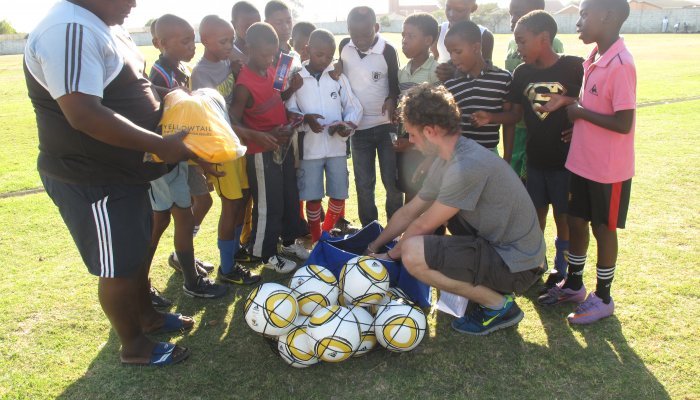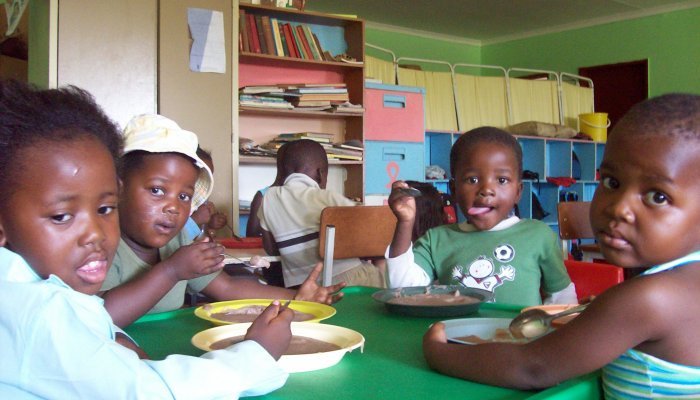How does one compete in an increasingly commoditised hospitality industry? For Henko Wentholt, General Manager of Abang Africa Travel (www.abangafrica.com), differentiation is key.
“The only way we can survive is by offering different experiences and ensuring added value for visitors,” he says. “That comes from sustainable community tourism.”
Founded in 2005, the company’s mission is to promote travel with heart and soul. It’s about giving travellers authentic experiences they value. It’s also about being responsible; not in a boring or guilt-inducing way but in a way that Wentholt describes as engaging, honest, and fun.
“There’s a world of opportunity ready to be discovered by visitors but also a world of opportunity for people in South Africa to engage with visitors, make money out of them, and improve their livelihoods,” he says. “It’s a world where travellers have a positive impact but also where communities benefit, in financial and non-financial ways.”
Changing perceptions
Because most news about Africa is negative, foreigners can be reluctant to visit. Worse, when Abang Africa Travel tries to convince tourists about its sustainable offering, many don’t believe it’s true.
“We’re selling a sustainable product but the market is still hesitant,” he says. “Responsible tourism still has a ‘tree-hugger’ label. That makes people suspicious.”
Changing perceptions required Abang Africa Travel to “walk the talk”. It became certified with Fair Trade Tourism in South Africa and Travelife in the UK. It also created a trust, to which it channels 10% of profits. This sponsors, among other things, projects on the Cape Flats.
“It’s common business sense,” Wentholt says. “We’re selling something that we need to sell in the future. What happens with many tourism companies nowadays is like chopping down a tree and selling little pieces of wood. And in twenty years’ time they won’t have anything to sell. So why would we destroy our own livelihood and not safeguard it?”
Telling better stories
These and other efforts have made it easier for Abang Africa Travel to market itself. Because being a five-star property isn’t enough, Wentholt believes that sustainable tourism makes it easier to appeal to the concerns of a new generation. It also helps companies tell better stories, which is something Mantis Collection (mantiscollection.com) has at its core.
“The name came from my dear friend Dr Ian Player at the Wilderness Foundation,” says founder and chairman Adrian Gardiner, who also founded Shamwari Game Reserve. “He said that because our products are small, we should call it Mantis Collection. We took that further and created the acronym: man and nature together is sustainable.”
Since its beginning in 2000, the company has expanded its hotels, eco-escapes, and lifestyle resorts around the world. But while it’s been praised for environmental practices, with each property sensitive to its surroundings, that didn’t stop Gardiner from focusing on the bottom line.
“We have our own version of the big five: development, hospitality, sales and marketing, education, and conservation,” he explains. “But at this stage in my life, the two things most important are education and conservation. As I once heard Johann Rupert say, to do good, you have to have done well.”
The USP of Africa
Gardiner cites several examples of lives changed through their work. In one instance, he recognised potential in a cleaner from a block of flats he managed. Gardiner got him a driver’s licence, taught him how to use a computer, and secured him a job at a game reserve.
“He didn’t want to go,” Gardiner admits. “But he became the head ranger and, a few months ago, one of our clients flew him to America to spend a week in his hotel. That guy’s life is changed forever. And that’s what I call profit out of tourism. It benefits the bottom line in the long run.”
On the education side, Gardiner was a founder of Stenden University South Africa in Port Alfred. He explains that it’s the only place in the world where B.Com Hospitality Management students can do a semester in wildlife management. By educating people closest to the environments that need protection, Gardiner believes that responsible tourism will grow.
“The USP of Africa is our wildlife and our people,” he says. “If we don’t look after both, the tourists won’t come. And we’ve got a war on our hands. Our wildlife is being decimated; hence my time and effort trying to protect one of our USPs. I just hope we’re going to win this war. It’s one hell of a battle.”
“Our ethic with regard to responsible tourism focuses on enhancement of our people, protection of the environment, and our partner associations,” Gardiner says, citing its relationships with non-profit organisations like Tusk Trust (of which Prince William is Royal Patron), MAD Charity (started by Francois Pienaar), and more. “When you look after those, the profit will grow. But if we don’t tell people what we’re doing in Africa, and give some of the profit back to the people who are helping us, it’s a no-win situation.”
Spreading the word
Despite the challenges, Gardiner admits to being “a positive guy” who believes we can make things work. Equally positive was Glynn O’Leary, co-founder and CEO of Transfrontier Parks Destinations, when he had the opportunity to take over !Xaus Lodge (xauslodge.co.za) in the Northern Cape.
“It was built and left deserted for three years,” he recalls. “Every major lodge-owning company in South Africa was invited to have a look at it. They all said there was no way it could work.”
Never mind that the community wrote off the property as a “white elephant”. Never mind it being situated in an area that was part of a disputed land claim between the ‡Khomani San and the Mier. And never mind its remote location. O’Leary took a chance.
“From Kgalagadi to Upington is 360km,” he says. “So to put yoghurt on the table for breakfast, we do a 720km round trip to shop. We use half a tank of fuel to fill the vehicle and have to lug it back in 500 litre drums.”
Because the lodge doesn’t have gravel road access, visitors drive through 35km of sand – and across almost 100 dunes – to arrive. But more challenging than the logistics is spreading the word about what !Xaus Lodge offers.
“We were forced to turn the challenges into success,” O’Leary says. “But one of the biggest challenges is that not all tour operators recognise what we’re doing as important. We need to get more of them involved in responsible tourism and what it means.”
Listen to the sunset
There are several aspects to responsible tourism for !Xaus Lodge. First, the community chose its name – it means ‘heart’ in the Nama language – and is involved in management through a joint board. The lodge has also trained Bushmen trackers including Melissa Mienies, the first Mier community female guide.
“We have a crafting village with Bushmen crafters but we don’t dictate how they operate,” O’Leary says. “We let them decide whether or not they’re going to be in their traditional clothes. That sometimes creates a challenge for us. But we explain that if guests arrived hoping to see the Bushmen as they lived a hundred years ago, they’ve arrived a hundred years too late.”
Indeed, in an area almost twice the size of the Kruger National Park, O’Leary explains to visitors that seeing animals is a privilege and not a right. But one thing they don’t fuss about is the natural beauty that makes !Xaus Lodge an ideal place to “listen to the sunset”, and, as one guide said, see the world by day and see the universe by night.
A leap of faith
Even though the goal of a business is to make a profit, O’Leary explains that making an “unreasonable profit” could risk failure by leading to a clash between companies and communities. It’s why !Xaus Lodge regularly renegotiates its long-term agreements, sometimes to its detriment, to ensure they remain fair.
“If we don’t do that, tourism in our rural environments is doomed,” he says. “And if tourism in our rural environments is doomed, conservation in our rural environments is doomed. It’s something we have to keep in mind.”
Staying focused on what matters most has served !Xaus Lodge well. Since it opened in 2008, it’s generated R25m income for the regional economy and the local community has also earned significant income through salaries and craft sales.
“We took a leap of faith, believed we could make it work, and I think we have,” O’Leary says. “When you have a 24-bed lodge in an environment like that, generating that kind of economic activity, we’ve done something right. That’s what responsible tourism is about.”
Beyond our borders: Parks and recreation
When coming to Cape Town for the annual We Are Africa travel expo earlier this year, Emmanuel de Merode wasn’t sure how to pitch his offering. But, as Director and Chief Warden of the Virunga National Park in the DRC, he didn’t want to present a sanitised version of what he’s lived through, even though the reality might make tourists reluctant to come.
“We have an experienced intelligence scheme that looks at the local security situation and wider political context so we’re able to tell far in advance when there are potential problems on the horizon,” he says. “But we don’t control all the elements. And of course, during periods of armed conflict, it’s impossible to do tourism and you suspend it. But there are also long periods in which there is relative peace and, during those periods, it’s possible to bring visitors safely.”
Indeed, since the park reopened to the public in 2014, it’s had thousands of visitors without a single incident. This is thanks to the effort to build a team of committed rangers who provide security to visitors and the local population. De Merode describes it as “the big breakthrough” for Virunga and the region as a whole.
“Virunga has seen the development of a remarkable thing with tourism over the last few years,” he says. “The first real drive was to reform the institution and build a tourism industry around it that also helps to make the government institution, which is a national park service, more sustainable.”
Although tourism brought the notion that things can happen in Virguna, it hasn’t been just about the money. Yes, attracting high quality visitors is helping the park meet its growing budget. But tourism has also brought more exposure to the isolated region, already famous for its endangered mountain gorillas. And once it’s clear that people can visit safely, it becomes clear that they can invest safely too.






